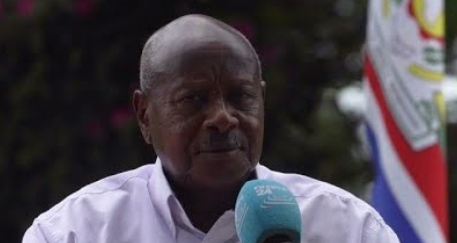Photo: YouTube
The mismanagement of taxes in Uganda is a complex and multifaceted issue that has far-reaching consequences for individuals, businesses, and society as a whole. At its core, it involves the failure of the NRM (National Resistance Movement) criminal government officials and institutions to effectively collect and use tax revenues for the benefit of the public.
One of the most significant consequences of mismanaged taxes is the erosion of public trust in government. When citizens feel that their hard-earned money is not being used for the common good, they may become less likely to comply with tax laws and regulations, further exacerbating the problem.
Another consequence is the unequal distribution of the tax burden, with low-income earners and small businesses often bearing a disproportionate share of the burden. This has led to economic inequality and social unrest.
As Kampala government runs broke and donors are elusive to fund the highly inflated budget, apart from a few, Uganda Revenue Authority collects lots of money which is not accounted for or doesn’t reflect on the revenue collections especially most of the taxes collected from the imports. The story of how gold is currently the leading export yet Uganda has very few gold mines, and traces from the DRC conflict, shall be for another day.
I was recently made aware by an old boy of mine who works with URA that on average, 300-400 fuel tankers cross into Uganda daily. These cross into the country through various border points especially from Tanzania, Kenya and South Sudan. Some are imported in the country and others on transit to Rwanda, Burundi, Democratic Republic of Congo (DRC) and also Central African Republic.
The average fuel tanker carries a maximum of 60,000 litres and for argument’s sake, we’ll say the trucks coming into Uganda have an average capacity of about 30,000 litres.
The Ugandan government levies an excise duty of 1450 UGX per litre so 30,000 litres times 1450 UGX= 43,500,000 UGX (per truck). 300 trucks times 43,500,000 UGX= 13,050,000,000 UGX. So the Ugandan government collects a minimum of UGX13 billion a day from fuel alone, so in a period of one year, that’s about UGX4.7 trillion, and we are talking minimums here.
It is important to note that it is not only fuel that is imported in the country but there are other trucks that come in carrying other goods from Mombasa port and several other border points which are also taxed and there are thousands of trucks that flow in from all the directions.
On average, income tax depletes a minimum of 20% of the citizens’ salaries. Let’s look at an example of four companies for a rough estimate, East African Breweries Limited (EABL) Crown beverages, MTN Uganda, Centenary Bank—that is over 13,000 employees and since the top management earns in excess of UGX 50 million shillings, if we cut and distribute, I think it would be fair to say that each of these 13,000 employees are earning a minimum of UGX600,000 per month which comes to UGX 7.2 million shillings, that comes to 18.72 billion from just income tax. Now if we are to collect the actual data from all the big corporations in Uganda and we do the math, you will be shocked at how Ugandans have contributed to economic growth but the criminal government has impoverished the country.
Every foreigner that’s not of East African descent is required to pay 2,500 USD a year, and surrender a minimum of 35% of their salary in taxes. I’m not going to mention NSSF remittance here because you will be shocked at how much money these thugs swindle!
The minimum a business can pay to URA in a year is UGX 250,000 and in Central Uganda there are over 50,000 shops and other businesses that are supposed to remit that UGX250,000 yearly, that’s UGX12,500,000,000 of course some don’t pay, but they are accumulating funny fines, that will eventually bite them. Every signpost in Kampala attracts a minimum of 200k a year from Kampala Capital City Authority (KCCA).
That’s the tip of the iceberg. It is disappointing how the country is presently broke and cannot afford to finance its budget as a result of 70% of revenue collections being stolen. The budget is 90% funded by donations and loans, and the public debt burden has reached the highest UGX 79 trillion yet the despot is still moving around mortgaging the country to the highest bidder.
Just in 2019, the national debt was about UGX56 trillion and now, four years later, even the members of parliament who acquiesce to such loans, are worried.
In conclusion, the mismanagement of taxes is a serious issue with far-reaching consequences for individuals, businesses, and society as a whole. It is essential that government officials and institutions take steps to address this problem in order to ensure the fair and efficient use of tax revenues for the benefit of all citizens.
KAKWENZA RUKIRABASHAIJA
Lawyer and Novelist.
Website: www.kakwenza.de
Email: [email protected].
Whatsapp/Signal: +447958104814
Facebook|Twitter|Instagram|Linkedin






